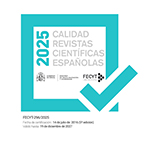Amor Mundi and Saving the Circumstance: Loving a technoscientific world according to José Ortega y Gasset and Hannah Arendt
Abstract
José Ortega y Gasset and Hannah Arendt were two thinkers influenced by the phenomenological tradition for whom worldly experiences within a specific circumstance were essential to what it means to be human. This article, first, examines their notions of ‘amor mundi’ (Arendt) and ‘salvation of circumstance’ (Ortega), pointing out their similarities concerning the individual’s relationship to the world. It then moves on to investigate some of Ortega’s and Arendt’s conceptions about science, technology, and the concomitant bureaucratization and technocratization of the world. The main thesis of this article will be that both thinkers fundamentally coincide on how the individual must relate to an increasingly scientifically and technologically-mediated world that produces isolation and mass–people.
Downloads
Article download
License
In order to support the global exchange of knowledge, the journal Revista de Filosofía is allowing unrestricted access to its content as from its publication in this electronic edition, and as such it is an open-access journal. The originals published in this journal are the property of the Complutense University of Madrid and any reproduction thereof in full or in part must cite the source. All content is distributed under a Creative Commons Attribution 4.0 use and distribution licence (CC BY 4.0). This circumstance must be expressly stated in these terms where necessary. You can view the summary and the complete legal text of the licence.












